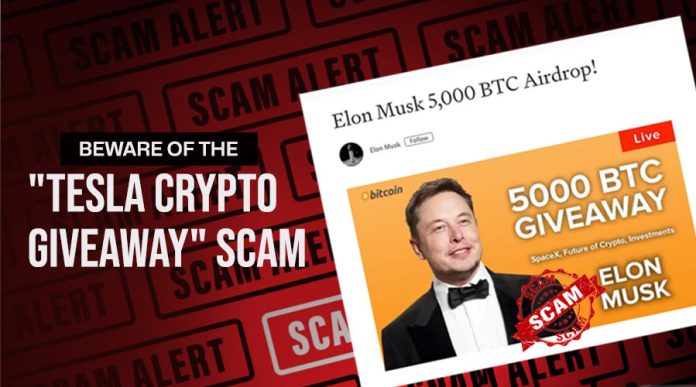Beware of the Elon Musk Crypto Giveaway Scam Promising Unrealistic Returns
The “Tesla Crypto Giveaway” scam is a cunning and dangerous scheme that scammers are using to steal cryptocurrency. By impersonating well-known personalities, particularly Elon Musk, these fraudsters lure victims into sending their crypto with the false promise of massive returns.
Here’s what you need to know about this scam and how to protect yourself.
Understanding the “Tesla Crypto Giveaway” Scam
In this scam, criminals create fake social media accounts that mimic those of Elon Musk or Tesla. These fraudulent accounts run enticing campaigns, such as “Elon Crypto Giveaway” or “Musk Crypto Giveaway,” claiming that if you send cryptocurrency to a specific address, you will receive double or even triple the amount in return. For example, they may promise 20 million Dogecoins, 400 Ethereum, or 40 Bitcoin as a reward for participating.
These promises are entirely fraudulent. Once you transfer your cryptocurrency, it’s gone for good. Scammers exploit the names of famous individuals like Elon Musk or use phrases like “Elon Musk Crypto” to give their schemes a veneer of credibility, fooling people into believing they are taking part in a legitimate giveaway. Unfortunately, nearly all of these crypto giveaways are scams, leading to significant financial losses for the victims, as cryptocurrency transactions are irreversible.
How to Identify and Avoid the Elon Crypto Giveaway Scam
To protect yourself from falling prey to the “Tesla Crypto Giveaway” scam or similar fraudulent activities, consider the following precautions:
Verify Social Media Accounts: Ensure that social media accounts you interact with are verified and legitimate. Look for the blue checkmark that indicates the account’s authenticity.
Be Skeptical of Unusual Offers: Be wary of any promotions that promise to multiply your cryptocurrencies. Such offers are usually red flags signaling a scam.
Consult Official Sources: Always rely on official websites and trusted sources for information and transactions. Avoid engaging with unofficial or suspicious platforms.
Avoid Clicking Suspicious Links: Don’t click on ads or pop-ups that seem too good to be true, especially those promoting cryptocurrency giveaways. These are often traps set by scammers.
If you suspect your device has been compromised by malware from a scam site, run a scan with a reputable antivirus tool, such as Combo Cleaner, to remove any malicious applications.
The Role of High-Profile Figures in the Scam
The “Tesla Crypto Giveaway” scam often leverages the names of well-known figures, like Elon Musk, to gain credibility. Musk is a frequent target for scammers due to his high profile in the crypto world. By using his name or Tesla’s brand, scammers hope to make their schemes appear legitimate and trustworthy.
Recent developments show how easily the involvement of high-profile figures like Elon Musk and Donald Trump in the crypto space can be exploited. While Trump’s direct involvement in cryptocurrency is still a subject of speculation, his family’s potential development of a decentralized finance (DeFi) platform has fueled rumors. This project, sometimes referred to as “Trump Crypto,” has generated significant buzz, though it remains officially unconfirmed.
Donald Trump Jr. has also cautioned the public against fake tokens purporting to be linked to the Trump crypto project, urging individuals to be vigilant and wait for official announcements before engaging.
Conclusion
Cryptocurrency users face a serious threat from scams like the “Tesla Crypto Giveaway” and similar fraudulent activities. Scammers often use the names of high-profile figures like Elon Musk and Donald Trump to add a layer of legitimacy to their schemes. To protect yourself, always verify the authenticity of any cryptocurrency giveaway and be skeptical of offers that seem too good to be true.
By staying informed and adhering to best practices for online security, you can avoid falling victim to these scams. Remember, genuine promotions do not require an initial investment or offer unrealistically high returns. Keep your cryptocurrency safe by remaining cautious and skeptical of suspicious offers.


